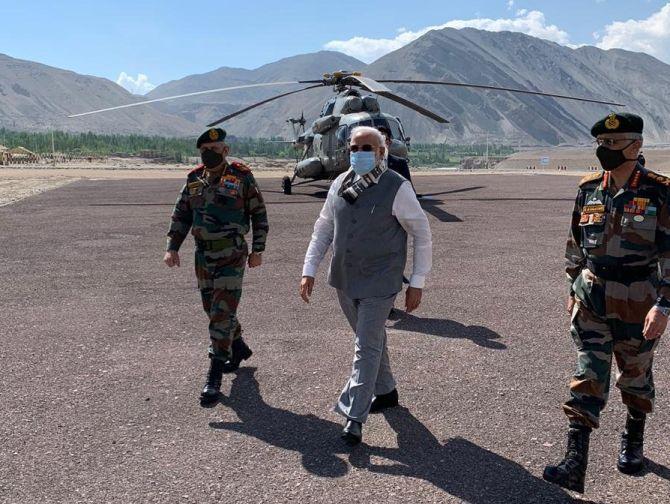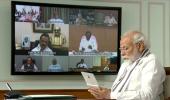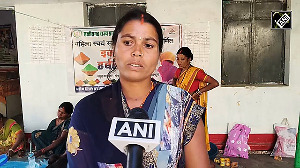As the China factor enters the body politic of India with greater potency, its consequences will certainly be far-reaching, note Harsh V Pant and Vinay Kaura.

Earlier, Defence Minister Rajnath Singh was to have visited Leh on Friday, accompanied by General Naravane, but Singh's trip was cancelled, in likely deference to Modi's visit to the front. Photograph: ANI Photo
The Galwan tragedy has radically changed India's national perception about China as a neighbour and an Asian power.
The manner of killing of 20 soldiers of the Indian Army on June 15 has reverberated across India, and is likely to stay in the collective memory for a long time.
There is public anger against China and a dominant feeling that China has to be stopped before it succeeds in changing the status quo on the India-China boundary.
Why this incident is a game changer in India-China relations is not difficult to understand.
This was the first time since 1975 that an Indian life has been lost defending the un-demarcated border against China.
Moreover, the Chinese side broke not only the agreements with India signed from time to time, but also violated the fundamental norms of conflict.
With the China threat becoming real, any discussion about that country will now have greater national security dimensions.
Consequently, China is going to assume a strong place in the public consciousness.
This will inevitably result in China becoming a dominant issue in India's domestic politics, with its implications on public opinion and electoral competition.
Domestic politics has always had an impact on foreign policy, and China will impact India's domestic politics in a decisive manner.
So far, no other foreign policy issue has had resonance for Indian politics other than Pakistan, and this is quite understandable.
Pakistan is not a mere foreign policy or national security issue for the majority of Indians; it is an emotional one.
Most Indians perceive Pakistan as the country's implacable enemy and a source of constant headache.
In popular imagination, Bollywood, cricket, and electoral campaigns, taking on Pakistan has been equivalent to bravery worthy of respect.
Moreover, Pakistan's revisionism in Kashmir, its support for anti-India terrorist groups, and continued wars against India have often been part and parcel of India’s political discourse.
But Indians have not held such extreme sentiments for China despite the humiliation of losing the 1962 War.
With China now emerging as the main strategic threat to India, the political discourse will have to accommodate the new threat.
China's stubborn efforts to nibble away Indian land through armed incursions, its claim over the entire Arunachal Pradesh, unsustainable trade deficit, 'all-weather' friendship with Pakistan, attempts to encourage India's neighbours to turn hostile against it, and its rising global ambitions to establish a China-centric world order through the Belt and Road Initiative were mostly confined to the academic or strategic affairs community.
But now these issues will be watched and debated in political circles.
Since there is recognition in official circles of the power asymmetry between the two countries, India's official line toward China has remained accommodative and conciliatory.
India's economy is much weaker, its military and technological capabilities remain inferior to China's, and China is a more significant player in global governance and international politics than India.
With growing power, China wants to reshape the global order to suit its revisionist interests.
Although China has not hidden these aims, India has been tentative at best in coming to terms with the fact that a revisionist great power has risen on its borders.
This policy approach could work for so long because China was not a dominant issue that informed debates in domestic politics.
But the ramifications of the military stand-off in the Galwan Valley will reverberate strongly across the country and domestic politics.
This poses a huge challenge for the Narendra Damodardas Modi government's approach toward China as its policies cannot be out of sync with popular sentiment.
The Indian citizenry has become alarmed over the sudden turn of events vis-à-vis China.
The calls for destroying the omnipresence of Chinese goods in India may be rooted in ignorance of economic realities, but they reflect the emerging mood about China.
And this mood will dictate India's domestic politics and foreign policy.
The evolution of public opinion will have an impact on ghe political discourse.
Prime Minister Modi has been virtually impervious to criticism on issues of national security, but it is Mr Modi's tough image that his domestic political critics are now trying to target.
When Beijing shows greater penchant for psychologically oriented use of military force against India, the Modi government's advice to the Opposition not to politicise the national security issues will only fall on deaf ears.
This is a moment of realisation; a moment of great turbulence in India's foreign policy and domestic politics.
With no clear way to end the impasse between the two countries, there is a growing risk of societal polarisation.
As the China factor enters into the body politic of India with greater potency, its consequences will certainly be far-reaching.
For the government and the Opposition, the challenge will be how to present a united front to China even while continuing with domestic political contestation on one of the most significant policy issues facing the nation.
Harsh V Pant is professor of international relations at King's College, London; Vinay Kaura is an assistant professor, Sardar Patel University of Police, Security and Criminal Justice, Jaipur.












 © 2025
© 2025